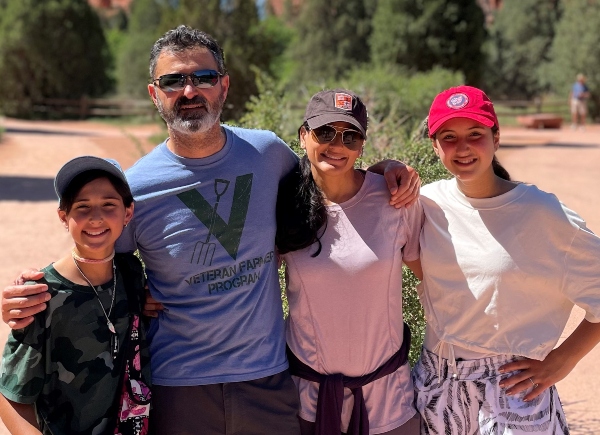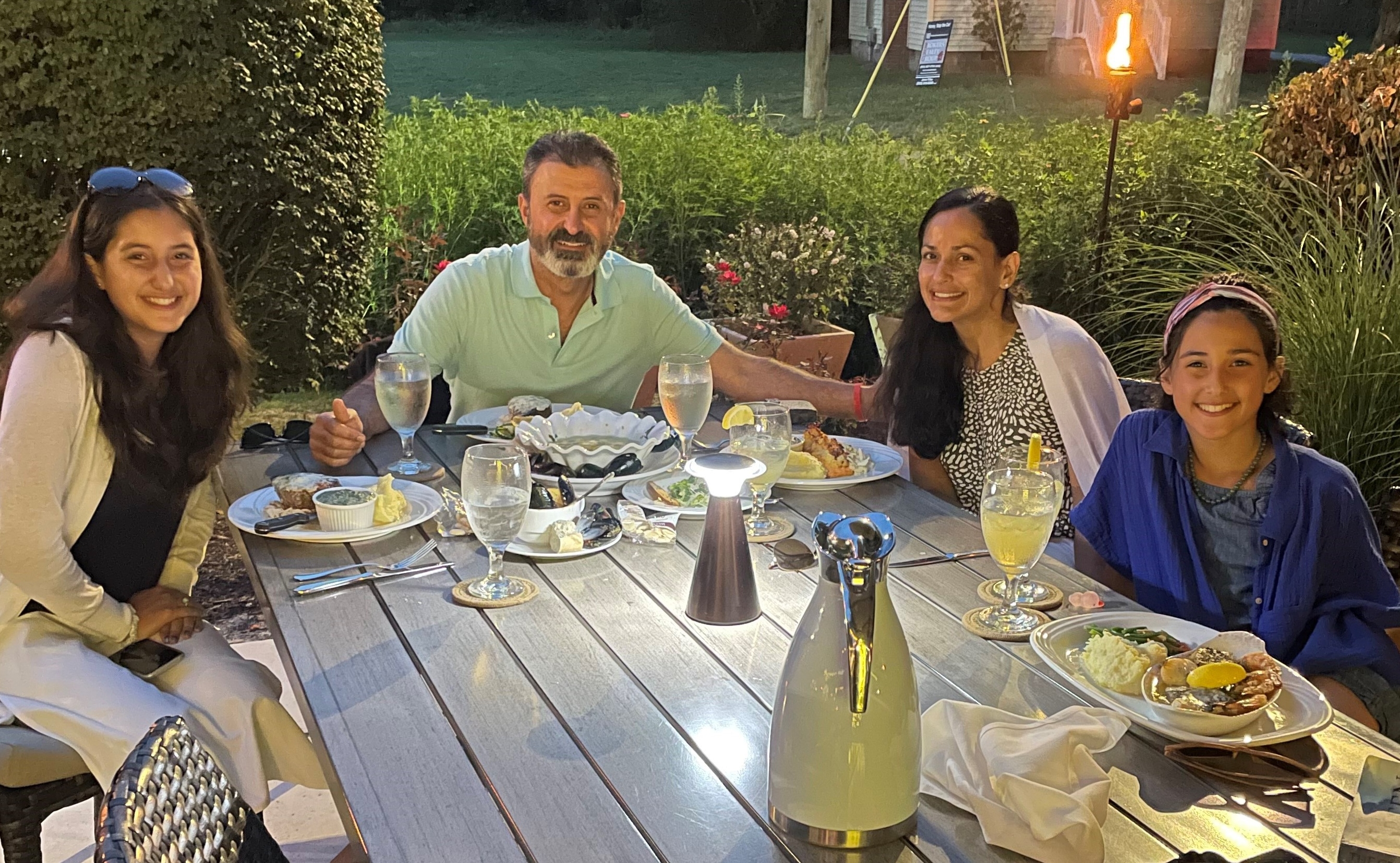Prioritizing the Mental Health and Resilience of Youth Caregivers in Veteran Families

Sinaiyah and Azara Emami are military kids who have drawn upon the lessons they’ve learned and developed unique ways to cope with adversity and build resilience. At a young age, they were thrown into caregiver roles for their veteran parents.
Sinaiyah is 14, Azara is 11, and their parents are both Air Force veterans. This pair of bright sisters have already experienced their share of life’s challenges, from military relocations to parental medical issues and their dad’s unexpected retirement. Their resilience has empowered them to meet those challenges with courage and provide their parents light and hope during tough times.
“I already knew my daughters had really adapted because when we moved to Virginia from California after multiple moves, I thought it was going to be harder, but they went along for the ride,” their mom, Omy, said. “The resilience they’ve built helped them adapt. They were persistent and had less anxiety than I expected.”
The girls continued to show their resilience, especially after their dad’s injury and medical complications while still on active duty – a time when the whole family’s plans and aspirations were detoured. “I felt that I was trying to salvage our family’s future plans,” said Omy, who at that moment, was wearing many hats. Omy was a part-time mental health counselor and full-time mom, homeschool teacher, and caregiver to her husband, Nima.
“My mom has been the best at working with all the curveballs thrown at her,” Azara said. “She has helped us when we are sad and always loves and takes care of us. It is still hard because Mom doesn’t feel good a lot of the time. [But] she is the best mom anyone could have.”
Recharging the Batteries
Wounded Warrior Project® (WWP) understands the sacrifices military families and caregivers make. We're committed to helping the next generation in the long-term – supporting the building of healthy families, and helping young people thrive.
Find out how WWP helps wounded veterans and their family members.
In partnership with the Elizabeth Dole Foundation, WWP powered groundbreaking Mathematica research that found approximately 2.3 million children and youth currently serve in caregiving roles for their military-connected family member. We call them Hidden Helpers - children, youth, and young adults (up to age 18) who are actively involved in or currently impacted by the care needs of a wounded, ill, or injured veteran.
For children serving in this role, caregiving puts an additional strain on their mental health compared to their civilian peers. Research found that Hidden Helpers were more likely to experience isolation or experience concerns like stress and burnout. In a concerted effort to support this population, WWP committed $1.5 million to power programs and initiatives offered by organizations within the Hidden Helpers Coalition, a collective of over 70 organizations dedicated to the provision of programs, services, and advocacy in support of Hidden Helpers. WWP is proud to co-chair this initiative alongside the Elizabeth Dole Foundation.
WWP offers programs and services to support military caregivers, including children. In addition, WWP collaborates with other community partners to help improve the lives of military families. Sinaiyah and Azara have benefited from the work of WWP’s community partners. Our Military Kids® (OMK) has been instrumental in their growth. OMK recognized and provided scholarships to both Sinaiyah and Azara for extracurricular activities.
For veteran parents Omy and Nima, both of whom are registered WWP warriors, the journey has been a process of gaining trust and learning to rely on a network of support.

“When we were thrown into the chaos of Nima’s medical retirement, I could not see past the pain and turmoil ... I was so adamant about protecting my husband's career that I became resentful toward veterans service organizations,” Omy said. “In many ways, I saw them as stumbling blocks because, in my head, we were not going to be retired.”
After denial and grief, Omy said she felt a deep darkness. It took years to come to terms with their new situation. Omy began to see the resources that would eventually help her and her family live better lives.
“Most importantly, I loved the people we met along the way,” Omy said. “They became family. We now make every attempt to remain involved with these organizations and even try to give back as we can.”
The family now volunteers with veterans service organizations to help welcome new military families. They also host families they have met via WWP at their home.
“We host dinners at least quarterly, where we invite Wounded Warrior Project friends to fellowship and break bread together,” Omy said. “It is a sweet time – especially watching the kids connect and build bonds. We're so grateful for what we have gained through these organizations.”
The Other Side of the Tunnel
Sinaiyah and Azara have always greeted tunnels on the road from the back seat of their family car by lifting their hands in the air and cheerfully yelling “tunnel.” Their ability to willingly welcome the unknown ahead of them has helped both embrace their roles as Hidden Helpers and has taught them how to share their journey and verbalize their feelings.
“Don’t try to hide the pain and struggle. Share it with Jesus, your parents, and people you feel comfortable with,” Azara said. “Most importantly, remember: You are not alone.”
Grants from OMK help Azara remain active in STEM, track, and violin lessons, while Sinaiyah has received support to continue piano lessons. WWP is proud to enter its sixth year of partnership with OMK, supporting the organization’s Combat Injured Program and their families. OMK grants enable military and veteran children to engage in their communities, broaden their interests, and feed their passions, strengthening the family unit, and building skills that will last a lifetime.
Sinaiyah is optimistic about the family’s involvement in equine therapy, and her own extracurricular activities like theater, writing, and Civil Air Patrol Youth Cadets, where she’s had a chance to fly in a small airplane.
“I’m also interested in psychology, especially child therapy,” Sinaiyah said. She hopes to be able to help kids like herself who grew up with the challenges and adaptation of military families. Sinaiyah’s inquisitive nature also draws her toward journalism – another way to raise awareness about issues that touch the lives of civilians and military families.
Healing has been a lengthy process for Nima and Omy, and their daughters. What is evident in this family is their ability to share their feelings with each other and form strong bonds. That, in turn, allows them to be a beacon for others.
“I just want other young people who went through caring for parents to know that it can be hard and there were times when I would cry,” Azara said. “My mom, dad, and sister were my strength. Without my sister, I would not be who I am today. I also know that God is always there.”
For the parents, it’s reassuring to count on veterans service organizations that have their back and augment their work. Our Military Kids helps military children and teens like Sinaiyah and Azara pursue their passions during a parent’s deployment or recovery from combat-related injuries.
Learn more about how WWP and its community partners support military families, help enhance family wellness, and strengthen a shared sense of community.
Visit this page to learn about ways in which WWP supports military families.
Contact: Raquel Rivas — Public Relations, rrivas@woundedwarriorproject.org, 904.426.9783
About Wounded Warrior Project
Since 2003, Wounded Warrior Project® (WWP) has been meeting the growing needs of warriors, their families, and caregivers — helping them achieve their highest ambition. Learn more.